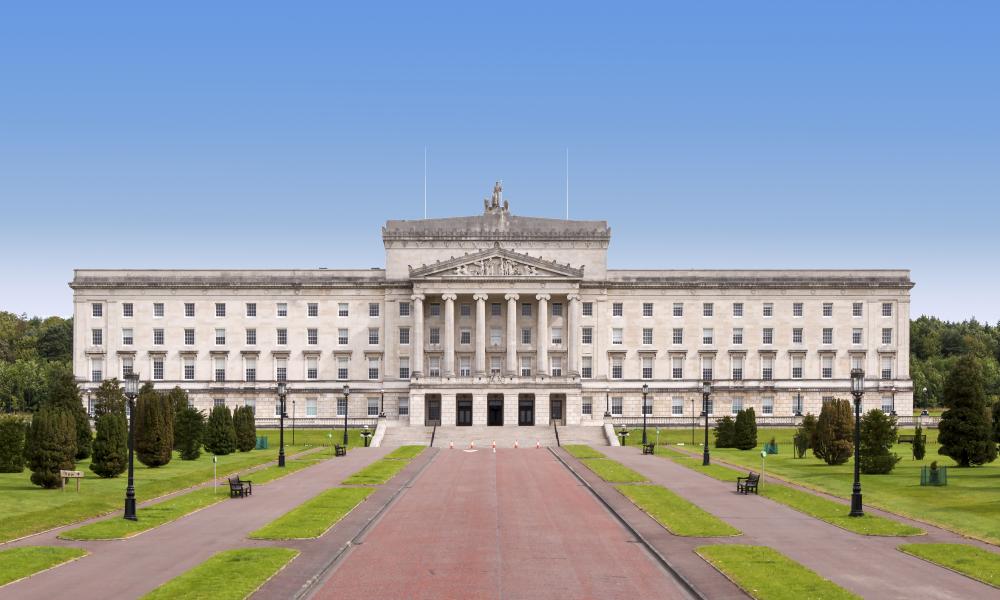

There have been many significant achievements in public health over the past 25 years, but considerable challenges lie ahead, in particular the impact of climate change on our health and on the health of the planet.
As part of the Institute of Public Health’s special anniversary event in October last year, we spoke to prominent voices in public health to take stock of past achievements and future challenges.
Set up prior to the signing of the Good Friday / Belfast Agreement in 1998, the Institute has been shaping public health policy across the island of Ireland for 25 years.
In this series of short videos, Martin McKee, Róisín Shortall, Des Cox, Anne Nolan, Norah Campbell, and Liz Mitchell give their personal perspectives on what progress has been made in public health while also casting an eye on challenges, old and new.
Watch: Professor of European Public Health, Martin McKee, shares
his thoughts on public health achievements and future priorities
Transcript: Martin McKee, Professor of European Public Health
I am Martin McKee and I'm Professor of European Public Health at the London School of Hygiene and Tropical Medicine.
What are your thoughts on future public health priorities?
I have a lot of thoughts on future public health priorities. I was a member of a pan-European Commission looking at health and sustainable development reporting to the World Health Organization and we set out a framework for thinking about these threats. Many of them related to the interaction between humans, animals, the natural environment, antimicrobial resistance and so on, and others related to the health of our planet. The things that we can't plan for, like, earthquakes, natural disasters, but also the things where we have a role to play, like global warming.
What is the greatest public health achievement of the past 25 years? Are there any particular successes that stand out in Ireland or Northern Ireland?
Ireland was the first country to introduce a ban on smoking in public places. Tobacco smoking has been one of the biggest immediate threats to public health throughout the 20th century and the rest of the world has looked at Ireland as being in the vanguard of this struggle.
Watch: Róisín Shortall, Social Democrats TD and Health Spokesperson shares
her thoughts on public health achievements and future priorities
Transcript: Róisín Shortall, Social Democrats TD and Health Spokesperson
My name is Róisín Shortall. I'm a TD for the Social Democrats and I'm the spokesperson on health.
What are your thoughts on future public health priorities?
I think there's enormous potential. We've been talking for years about the need to expand the capacity of public health, to put more emphasis on health promotion and early intervention and yet we haven't been doing that in practice. It is front and centre in relation to the Sláintecare programme but there are enablers that need to be put in place in order that public health can play its full part. Those enablers, I think, are first of all, better data systems and there are big problems there. I think the other thing is in relation to identifying the social determinants of health and tackling the growing problem of child poverty.
What is the greatest public health achievement of the past 25 years? Are there any particular successes that stand out in Ireland or Northern Ireland?
I think you'd have to say there are two things, you know, I think that come to my mind. The vaccination programmes, you know, operators throughout the schools, in particular child vaccinations and others, and they have been very successful and there's been very positive public acceptance of those. And, you know, we have avoided huge levels of illness as a result of that. I think the other role that public health has played, particularly in recent years, is highlighting the social determinants of health and also I think the commercial determinants of health. I think increasingly we're coming to understand those better.
What do you see as the greatest public health challenge that we face into the future?
I think it would have to be viruses, unknown viruses, and certainly after the experience of Covid, I think that is an enormous challenge. There are also challenges in terms of funding public health properly and recognising the importance of that and indeed funding anti-poverty measures. So, you know, is government serious about this or not? And that's the question, it's an open question and it is yet to be answered. You know, there's a lot of lip service being paid to the need to tackle these issues and yet, you know, time and time again, over recent years, the same issues are coming up. So why are we not doing this? Why are we not, why do we not have an objective resource allocation model, so that, you know, we can target those areas of greatest need and tackle the fact that we have, you know, the inverse care law. But also then I think to be much more strategic and targeted about health promotion messages because clearly they're not being heard by a lot of people. There are reasons for that and it's generally to do with poverty.
Watch: Anne Nolan from the Economic and Social Research Institute
shares her thoughts on public health achievements and future priorities
Transcript: Anne Nolan, Economic and Social Research Institute
I am Anne Nolan. I work at the Economic and Social Research Institute in Dublin.
What are your thoughts on future public health priorities?
I was really enthused by the discussion today. I think there was a lot of discussion, obviously about the sort of major risk factors that we think about in terms of public health, like things like smoking. But I think what really brought home to me in terms of the discussion was the sort of the broader determinants. So things like, you know, our housing conditions, poverty, inequality, wealth, education. So it's those sort of wider policies that are just as important in terms of public health, as the sort of action on the risk factors.
What is the greatest public health achievement of the past 25 years? Are there any particular successes that stand out in Ireland or Northern Ireland?
So the achievement I'm going to focus on, is in terms of our improvement in mortality. So, often we don't think enough about mortality. It's a sort of a really good indicator of social progress. It's something that we use to compare outcomes across countries and Ireland has achieved really impressive reductions in mortality, both in old age and you know, also in younger ages. If you look at infant mortality, for example, 25 years ago in 1998, we had a rate of infant mortality, that was slightly higher than the EU average. We're now a good bit below the EU average, it's continuing to fall and we have a rate that's a lot lower than our nearest neighbour in the UK and much lower than in the US. And I think this is something to be really celebrated. It means that there are now more children that are living, to contribute to society, and are there for their families. And I suppose that's due to achievements, not only in terms of core public health measures, but also those wider policies that I was talking about. So, things like better housing conditions, better environmental conditions, income supports, reductions in poverty.
What do you see as the greatest public health challenge that we face into the future?
I think one of the biggest challenges we face is still one of our most enduring challenges, which is inequalities in health outcomes across different population groups. So again, if I use that example of mortality, if you look at mortality very early in life, so even within the first week of life, you see real differences across population groups. So, for example, children that are born to mothers in lower socioeconomic positions have much higher mortality rates than children that are born to working better off mothers. And that's really striking and that's really something that we should be intervening on.
Watch: Professor Des Cox, Paediatric Respiratory Consultant, shares
his thoughts on achievements and future priorities in public health
Transcript: Des Cox, Paediatric Respiratory Consultant
My name is Professor Des Cox. I'm a consultant in paediatric respiratory medicine at CHI (Children’s Hospital Ireland) Crumlin and I was previously the chair of the policy group on tobacco for the RCPI (Royal College of Physicians of Ireland).
What is the greatest public health achievement of the past 25 years? Are there any particular successes that stand out in Ireland or Northern Ireland?
Well, there's been lots of different successes internationally and nationally and I suppose I'll pick one example from each. I think internationally, the response to Covid and the vaccine rollout was probably the biggest achievement in public health that we've seen. To get the vaccine rates that they did, not only in Ireland, but in many countries across the world, was a massive achievement. And I think what the previous speakers at the conference today were saying is that, you know, Covid has taught us a lot. And we should learn from it and how countries were able to mount a public health response to a public health emergency was extremely impressive to see. So, I think that was, for me, the greatest achievement of the last 25 years and demonstrated that we can unify and respond to, you know, a common problem from a public health standpoint. Nationally, I would’ve said, you know, as a tobacco control advocate, I'd have to be biased and say the smoking ban for workplaces that came in in 2002, certainly that's had the most dramatic impact on passive smoking. It's also de-normalised smoking as a behaviour in this country. And so, from that perspective, that's been a massive achievement. And of course, Ireland being a leader in that, I would like to have seen more legislative measures like that over the last 25 years, you know, more follow on, improving anti-tobacco legislation in Ireland. I felt that we maybe haven't done enough on that, but as a success, you know, I think we can look on that as one of the greater successes that we've had here in Ireland.
What do you see as the greatest public health challenge that we face into the future?
When I was thinking about this, the first thing that came to mind was climate change. And it's not only that climate change is going to affect all of us in different ways, but it's going to have a massive impact on public health. So, as global warming continues, we're going to see more and more natural disasters, we’re going to see more and more extreme weather conditions and that's going to move people from different continents on around, and it's going to cause greater refugee crises than we've never seen before. Also, you know, the changes in the climate, even on a national level in Ireland, what's going to happen? It's going to be wetter and warmer here and what's that going to change? That's going to have a massive impact on the health of our citizens. And I think we need to plan ahead for that. And, you know, experts in the area, we need to take into account what climate change will, how that will impact our health system, and how are we going to manage that. I think that's probably the greatest challenge that we're going to face. Obviously, again, as a tobacco control advocate, we would like to see more done towards introducing tobacco measures but certainly that's something that we should be working towards in the future in tobacco control and we need to be more proactive about that.
Watch: Norah Campbell from Trinity College Dublin, shares
her thoughts on public health achievements and future priorities
Transcript: Norah Campbell, Trinity College Dublin
My name is Norah Campbell. I'm an Associate Professor of Marketing in Trinity Business School at Trinity College, Dublin.
What is the greatest public health achievement of the past 25 years? Are there any particular successes that stand out in Ireland or Northern Ireland?
So I think one of the most recent and probably one of the most impactful public health achievements has been Ireland's public health alcohol bill. And the reason why is because it coalesced lots of public health actors from academia and from practice who came together and really worked to look at the reasons why alcohol was so available, so cheap, and so convenient for the entire population rather than focusing on individual acute level stresses caused by alcohol. And it's a model of the types of achievement and cultural shifts and paradigm shifts that can occur when we take a truly public health lens and work together to look at population level health rather than acute individual level health.
What do you see as the greatest public health challenge that we face into the future?
In the next 25 years, we are going to be living in an era of multiple cascading crises, probably the biggest one being the threat of climate change. And it is not an exaggeration to say that it will change our public health irrevocably, it will create what will be a paradigm shift in health, like a Copernican revolution, a Darwinian revolution in health. And in 25 years’ time, we will understand that the focus on health has to be at upstream prevention rather than in downstream cures. For too long, we have had four major industries that have contributed to population level ill health and inequities - alcohol, tobacco, ultra processed foods, and fossil fuel. They have created very high levels of concentrated wealth among very few members of the population and they've managed to externalise the costs of their unhealthy commodities on the rest of the population. We will necessarily see a change in that, where governments, because of the public health advocacy that is going on, will focus on degrowing these majorly difficult and deleterious industries. And when they do, they will create what the anthropologist Jason Hickel calls an almost miraculous convenience. Because what we do know now is that in degrowing industries like that, it actually contributes to population level wealth and health. And that is the shift that public health has already made. And it's all of our education systems, our governments, institutions, and indeed our medical institutions that are lagging behind what public health already knows.
Watch: Liz Mitchell, former IPH Chief Executive, shares her
thoughts on public health achievements and future priorities
Transcript: Liz Mitchell, Former Chief Executive at IPH
I am Liz Mitchell. I was a Deputy CMO (Chief Medical Officer) in the Department of Health in the North and I worked in the Institute of Public Health and ended up for a short time as the CEO.
What is the greatest public health achievement of the past 25 years? Are there any particular successes that stand out in Ireland or Northern Ireland?
Well, I think, it's always hard to pick one thing, but I really think in this case, it's no contest because I think tobacco control in both, here in the South and also in the North, have really been outstanding. I think Ireland led the way in terms of tobacco control and the ban of smoking in public places. And, I think in both jurisdictions, tobacco control has continued to be a strong feature of public health action. And I think the successes have shown, and indeed the Institute has recently helped with the review of the tobacco strategy in the North, which shows what progress has been made. Still challenges remain, of course, particularly in terms of health inequalities, in terms of tobacco control, and also in terms of how to deal with the new presence of vaping and e-cigarettes. So, we can't rest on our laurels yet. We have to keep on working.
What do you see as the greatest public health challenge that we face into the future?
Again, there are many possibilities for this in terms of what the greatest public health challenges for the future, but for me it has to be providing sustainable healthy food for the planet. And I think that applies across, in terms of the whole climate change agenda, in terms of what we're doing, in terms of pollution and all the other impacts that humanity is having on our environment. And then the challenges that we're getting so many highly processed foods, which are in their own way quite addictive and make us, you know, crave more. And yet, it's encouraging people to take a more healthy approach to their diet and to work with them on that so that we can all have adequate access to affordable food.


